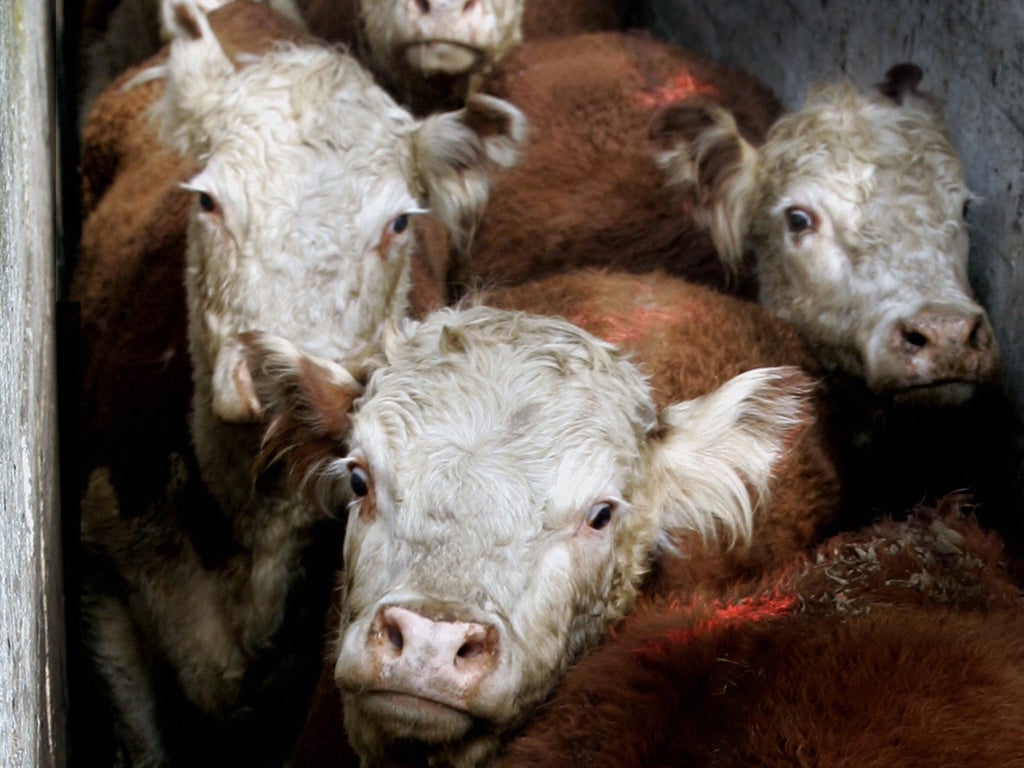Meat trade emissions equal to half of all Britain's cars
Meat and cheese top the list of foodstuffs that have a negative impact on the environment, according to research

If everyone in the UK went vegetarian or vegan it would have the same environmental benefit as talking half of all cars off the road, according to new research. Scientists have calculated the impact of 61 foods, with fresh meat and cheese topping the carbon footprint league.
They estimate that the combined greenhouse gas emissions from the foods we eat in the UK are the equivalent of 167 million tons of carbon dioxide, and switching to vegetarian diets could cut this by between 22 and 26 per cent.
Professor Nick Hewitt of Lancaster University, who carried out the research, said: "Our analysis shows that informed dietary choices can make a significant difference to greenhouse gas – reducing food-related emissions by around a quarter – with additional health benefits.''
Professor Hewitt, who carried out the work with colleagues from Small World Consulting, said that the potential saving of the nation becoming vegetarian could be as much as 40 million tons of carbon dioxide a year. "This is equivalent to a 50 per cent reduction in current exhaust pipe emissions of CO2 from the entire UK passenger car fleet.''
In the study, reported in the journal Energy Policy, researchers calculated the emissions of greenhouse gases associated with a wide range of foods and diets. Fresh meat and cheese are the top two for emissions. Meat has a carbon footprint at the checkout of 17kg of carbon dioxide per kilogram. Cheese has 15kg. Cooked meats are also high at 11kg per kilogram, with bacon at 9kg.
Exotic vegetables and mushrooms are high, largely because of freight and hothouse heating costs. Wine has a carbon footprint of 2kg per kilogram, and potatoes, apples, milk, bread and cereals are under 2kg. Home baking comes in at just over 2kg.
But the environmental campaigner Tony Juniper said cutting meat and dairy production altogether would not be as eco-friendly as the study suggests. "It's pretty clear that there are major environmental impacts that come with meat and dairy production, but I don't think it's as simple as saying that by ending meat and dairy production you'd get the kind of benefits that are implied by this kind of analysis. Organic farming relies on livestock to renew soil fertility and to work economically. For me, the challenge is not about whether we have meat and dairy production or not; it's how we do it in a sustainable way."
Dr Becky Lang, a nutrition expert at Warwick University, added that vegetarian diets can be a nutritional risk, if not managed carefully. "In general, there need be no nutritional problem with not eating meat, and there can be advantages to a vegetarian diet. Vegetarians tend to have a lower body mass index, and suffer less from cardiovascular disease. If people are switching suddenly to a vegetarian diet they should make sure they get all the nutrients they have been getting from meat, in particular, iron and vitamin B12."
Join our commenting forum
Join thought-provoking conversations, follow other Independent readers and see their replies
Comments
Bookmark popover
Removed from bookmarks